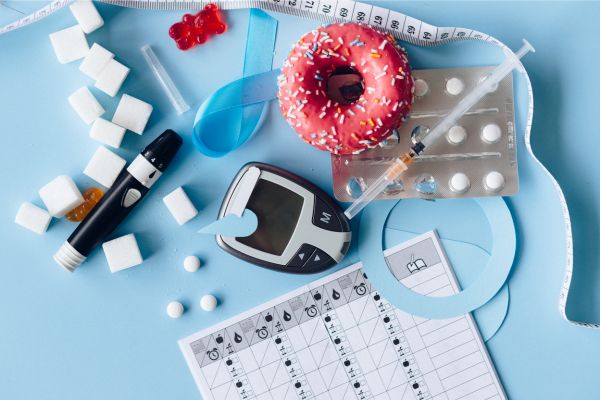Insulin resistance is a growing health concern, often leading to type 2 diabetes, obesity, and heart disease. While many people associate insulin resistance with a high-sugar diet, several lesser-known lifestyle habits also contribute to this condition. From how you sleep to how often you move, small daily choices can significantly impact your body’s ability to regulate blood sugar. Understanding these lifestyle habits can help you take control of your metabolic health before problems arise:

1. Skipping Breakfast
Many people believe skipping breakfast helps with weight management, but research suggests otherwise. Skipping the first meal of the day can cause blood sugar fluctuations, leading to increased insulin resistance over time.
Studies have found that people who eat a healthy breakfast tend to have better insulin sensitivity compared to those who delay their first meal. A high-protein, fiber-rich breakfast helps stabilize blood sugar and prevents mid-day cravings, reducing the likelihood of insulin spikes.
2. Chronic Stress and Poor Sleep
When you’re stressed, your body releases cortisol, a hormone that interferes with insulin function. Chronic stress keeps cortisol levels elevated, making it harder for insulin to regulate blood sugar effectively. Poor sleep has a similar impact.
According to studies, sleeping less than 6 hours per night can reduce insulin sensitivity by up to 20%. Prioritizing stress management and getting at least 7-8 hours of quality sleep can help improve insulin function and overall metabolic health.
3. Drinking Too Much Caffeine
While moderate caffeine consumption has health benefits, excessive intake—especially in the form of sugary energy drinks and multiple cups of coffee—can contribute to insulin resistance. Caffeine stimulates the release of adrenaline, which can temporarily reduce insulin sensitivity. Some studies suggest that in individuals predisposed to metabolic disorders, high caffeine intake may make it harder for the body to regulate blood sugar efficiently.

4. Eating Late at Night
Your body’s insulin response is closely tied to your circadian rhythm. Eating late at night can disrupt this balance, leading to increased blood sugar levels and poor insulin sensitivity. Research published in the Journal of Clinical Endocrinology & Metabolism found that people who eat late dinners experience higher blood sugar levels compared to those who eat earlier. Avoiding food at least two hours before bedtime can support better insulin regulation.
5. Sitting for Long Periods
A sedentary lifestyle is one of the leading causes of insulin resistance. Studies have shown that prolonged sitting, even for as little as 30 minutes, can decrease insulin sensitivity. Regular movement, such as standing up every hour or incorporating short walks throughout the day, helps your muscles use glucose more efficiently. Strength training and resistance exercises have also been shown to significantly improve insulin function.
6. Consuming Artificial Sweeteners
Many people turn to artificial sweeteners as a “healthier” alternative to sugar, but some of these substitutes may still impact insulin function. Studies have linked certain artificial sweeteners, like aspartame and sucralose, to changes in gut bacteria that can increase insulin resistance. While they don’t directly raise blood sugar levels, they may contribute to metabolic changes that make insulin regulation more difficult over time.
7. High Alcohol Consumption
Excessive alcohol intake negatively affects the liver, an organ crucial in blood sugar regulation. Heavy drinking can lead to fatty liver disease, which impairs insulin function and increases insulin resistance. Even moderate drinking can have an impact, depending on individual metabolism. Reducing alcohol intake or switching to lower-sugar alternatives can help support insulin sensitivity.

8. Eating a Low-Fiber Diet
Fiber plays a critical role in slowing glucose absorption, preventing sudden blood sugar spikes. A diet low in fiber—often high in refined carbohydrates—can lead to frequent insulin surges, increasing the risk of insulin resistance over time. Whole foods like vegetables, legumes, and whole grains provide fiber that helps maintain stable blood sugar levels and improve gut health, which is also linked to insulin function.
9. Exposure to Environmental Toxins
Environmental toxins, such as pesticides, BPA in plastics, and pollutants, can act as endocrine disruptors, affecting how insulin functions in the body. Research has linked exposure to these chemicals with higher risks of metabolic disorders, including insulin resistance. Limiting plastic use, choosing organic produce when possible, and using non-toxic household products can help minimize exposure to these harmful compounds.
10. Not Getting Enough Magnesium
Magnesium is a crucial mineral involved in insulin function, yet many people don’t get enough of it. Studies have found that individuals with low magnesium levels are more likely to develop insulin resistance. Foods rich in magnesium, such as spinach, nuts, seeds, and whole grains, can help support insulin sensitivity and overall metabolic health.
FAQs
1. What is insulin resistance, and why is it dangerous?
Insulin resistance occurs when the body’s cells stop responding effectively to insulin, leading to higher blood sugar levels. Over time, this can contribute to type 2 diabetes, heart disease, and other metabolic disorders.
2. Can insulin resistance be reversed with lifestyle changes?
Yes! Regular exercise, a balanced diet rich in fiber and healthy fats, stress management, and quality sleep can help improve insulin sensitivity and even reverse insulin resistance in some cases.
3. How does sleep impact insulin sensitivity?
Lack of sleep increases cortisol and disrupts insulin regulation, making it harder for the body to manage blood sugar levels. Prioritizing sleep can significantly improve insulin function.
4. Are all carbohydrates bad for insulin resistance?
No. Whole, unprocessed carbohydrates rich in fiber, such as quinoa, sweet potatoes, and lentils, can actually improve insulin sensitivity. The key is to avoid refined carbohydrates and sugary processed foods.
5. What are the early signs of insulin resistance?
Early signs include fatigue, frequent hunger, increased thirst, difficulty losing weight, and dark patches on the skin (acanthosis nigricans). If left unchecked, it can progress to type 2 diabetes.
Lifestyle Habits Contribute to Insulate Resistance
Many lifestyle habits unknowingly contribute to insulin resistance, but small, consistent changes can significantly improve metabolic health. By making conscious choices—like managing stress, eating fiber-rich foods, staying active, and limiting environmental toxins—you can support insulin sensitivity and reduce the risk of long-term health issues.




